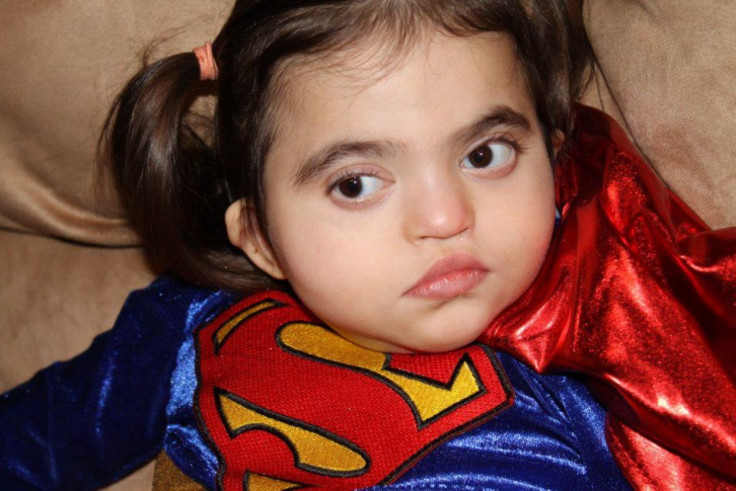Wolf-Hirschhorn Syndrome Tot Denied Kidney Transplant: What is the Disease?

The parents of 3-year-old Amelia Mia Rivera say a hospital denied a necessary kidney transplant for their daughter because she is already too sick, according to a report from ABC World News.
The 3-year-old has a complex disorder, Wolf-Hirschhorn Syndrome, that causes mental and physical impairments.
Mia's mother, Chrissy Rivera, said she would be willing to donate a kidney to her daughter, but the Children's Hospital of Philadelphia reportedly denied pursuing a transplant for the sick girl.
The 35-year-old mother blogged Friday about her daughter's plight and by Wednesday had received over 25,000 signatures in support.
Upon hearing the news that her daughter would be denied, Rivera blogged:
'Did you (the doctor) just say that Amelia shouldn't have the transplant done because she is mentally retarded? I am confused. Did you really just say that? ... My whole body trembles and he begins to tell me how (Amelia) will never be able to get on the waiting list because she is mentally retarded ... A bit of hope. I sit up and get excited ... 'Oh, that's ok! We plan on donating. If we aren't a match, we come from a large family and someone will donate. We don't want to be on the list. We will find our own donor.' ... 'Noooo. She-is-not-eligible-because-of-her-quality-of-life-Because-of-her-mental-delays' He says each word very slowly as if I am hard of hearing.
Hospital officials said they did not comment on individual cases, but sent out a prepared statement:
The Children's Hospital of Philadelphia does not disqualify potential transplant candidates on the basis of intellectual abilities. We have transplanted many children with a wide range of disabilities, including physical and intellectual disabilities. We at CHOP are deeply committed to providing the best possible medical care to all children, including those with any form of disability.
On its Facebook page, hospital official also wrote: We feel and understand your frustration, but we are unable to comment publicly on individual cases, it posted. Each child is unique, and our goal is always to provide the best possible medical care for each individual patient.
The case raises many questions about who receives transplants and under what conditions. The case also brings light to Wolf-Hirschhorn Syndrome, a disease that affects one out of every 50,000 births and causes death before the age of 2 in a third of cases. The disease also affects twice as many females as males, according to the National Institutes of Health.
In most cases, Wolf-Hirschhorn syndrome is caused by a deletion at the end of chromosome 4, a mutation that is not inherited, but forms randomly.
Most patients with the disorder not only have severe mental and physical disabilities, but show distinct facial features such as a flattened nose, high forehead and widely-spaced eyes.
No known treatment exists for the syndrome, but researchers are uncovering clues as to its underlying mechanism.
One candidate gene associated with the disease is involved in how a cell responds to DNA damage and the formation of cancers.
British researchers found that many genes may be involved in the facial characteristics of the disorder, according to a study published in January.
© Copyright IBTimes 2025. All rights reserved.





















